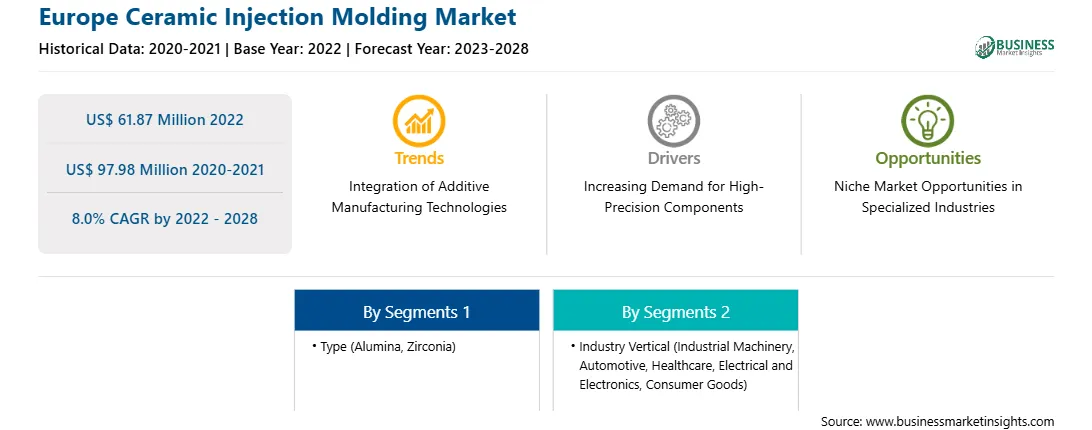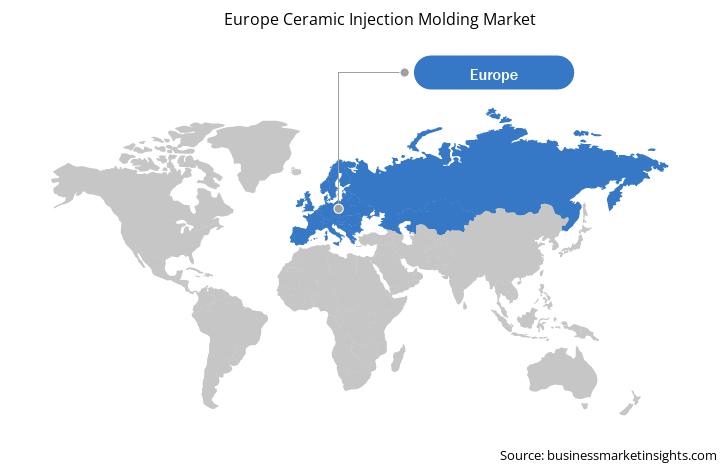Various Advantages Offered by Ceramic Injection Molding is Driving Europe Ceramic Injection Molding Market
The ceramic injection molding process is a type of powder injection molding which involves mixing ceramic powders such as alumina and zirconia with binders to form a feedstock which is then molded in a die cavity to form the desired component. The process is similar to metal powder injection molding process. By utilizing this technology, injection-molded ceramic parts of intricate geometries such as sockets, bearings, mobile phone buttons, dental implants, specific laptop keypads, and others could be manufactured with high precision and negligible wastage. Ceramic injection molding helps to obtain intricate designs using a cost-effective process. When a ceramic material is chosen for a specific application, the component's geometry has often been limited by the cost of shaping operations. Ceramic injection molding helps to overcome this issue by forming net shape parts in the tool. This makes it commercially feasible for previously rejected designs that were too difficult or expensive to manufacture using other traditional production techniques. Due to ceramics' inherent hardness, manufacturing components with complex shapes by standard machining processes can be expensive. Features such as multi-shaped blind holes, re-entrant angles, surface profiles, perpendicular holes, screw threads, undercuts, and intricate cavities are possible using ceramic injection molding technology. Furthermore, ceramic injection molding employs dependable equipment and advanced ceramic materials as well as compounds to produce ceramic components in a carefully controlled environment. This results in products of exceptional quality that meets the quality and aesthetic standards specific to a particular industry. Ceramic injection molding technology helps businesses to attain financial benefits from high-volume manufacturing, especially if they require new components as an alternative to existing designs. In addition, ceramic injection molding also helps acquire custom-made moldings of exceptional durability that meet all the required industry criteria. Also, ceramic injection molding components offer all the benefits associated with technical ceramics, including corrosion resistance, wear resistance, superior hardness, thermal stability, high mechanical strength, and dimensional stability. Thus, the advantages offered by ceramic injection molding is augmenting the Europe ceramic injection molding market growth.
Europe Ceramic Injection Molding Market Overview
The Europe ceramic injection molding market is divided into Germany, France, Italy, the UK, Russia, and the Rest of Europe. The demand for various types of ceramics, such as alumina, zirconia, zirconia, toughed alumina, and others, has increased from the end-use industries within the European region, particularly in Germany, France, and the UK. Steady growth in the automotive, electrical & electronics, aerospace & defense, medical, and other industries has had a noteworthy influence on the ceramic injection molding market in Europe. End-use industries in this region are adopting the ceramic injection molding process owing to its benefits such as resistance to abrasion and corrosion, improved strength, electrical conductivity, and appearance. In addition to that, CIM has several effects on an object, including changes in conductivity, hardness, brittleness, resistance, and lustre. Thus, the rising adoption of ceramic injection molding technology across various end-use industries in the region is significantly driving the market growth.
Strategic insights for the Europe Ceramic Injection Molding provides data-driven analysis of the industry landscape, including current trends, key players, and regional nuances. These insights offer actionable recommendations, enabling readers to differentiate themselves from competitors by identifying untapped segments or developing unique value propositions. Leveraging data analytics, these insights help industry players anticipate the market shifts, whether investors, manufacturers, or other stakeholders. A future-oriented perspective is essential, helping stakeholders anticipate market shifts and position themselves for long-term success in this dynamic region. Ultimately, effective strategic insights empower readers to make informed decisions that drive profitability and achieve their business objectives within the market. The geographic scope of the Europe Ceramic Injection Molding refers to the specific areas in which a business operates and competes. Understanding local distinctions, such as diverse consumer preferences (e.g., demand for specific plug types or battery backup durations), varying economic conditions, and regulatory environments, is crucial for tailoring strategies to specific markets. Businesses can expand their reach by identifying underserved areas or adapting their offerings to meet local demands. A clear market focus allows for more effective resource allocation, targeted marketing campaigns, and better positioning against local competitors, ultimately driving growth in those targeted areas.Europe Ceramic Injection Molding Strategic Insights

Europe Ceramic Injection Molding Report Scope
Report Attribute
Details
Market size in 2022
US$ 61.87 Million
Market Size by 2028
US$ 97.98 Million
Global CAGR (2022 - 2028)
8.0%
Historical Data
2020-2021
Forecast period
2023-2028
Segments Covered
By Type
By Industry Vertical
Regions and Countries Covered
Europe
Market leaders and key company profiles
Europe Ceramic Injection Molding Regional Insights

Europe Ceramic Injection Molding Market Segmentation
The Europe ceramic injection molding market is segmented based on type, industry vertical, and country.
Based on type, the Europe ceramic injection molding market is segmented into alumina, zirconia, and others. The alumina segment held the largest market share in 2022.
Based on industry vertical, the Europe ceramic injection molding market is segmented into industrial machinery, automotive, healthcare, electrical and electronics, consumer goods, and others. The healthcare segment held the largest market share in 2022.
Based on country, the Europe ceramic injection molding market has been categorized into the UK, Germany, France, Italy, Russia, and the Rest of Europe. Our regional analysis states that the Rest of Europe dominated the market in 2022.
AMT PTE. LTD., ARBURG GmbH + Co KG, CoorsTek Inc., INDO-MIM, KLAGER, Morgan Advanced Materials, and Oechsler AG are the leading companies operating in the Europe ceramic injection molding market.
The Europe Ceramic Injection Molding Market is valued at US$ 61.87 Million in 2022, it is projected to reach US$ 97.98 Million by 2028.
As per our report Europe Ceramic Injection Molding Market, the market size is valued at US$ 61.87 Million in 2022, projecting it to reach US$ 97.98 Million by 2028. This translates to a CAGR of approximately 8.0% during the forecast period.
The Europe Ceramic Injection Molding Market report typically cover these key segments-
The historic period, base year, and forecast period can vary slightly depending on the specific market research report. However, for the Europe Ceramic Injection Molding Market report:
The Europe Ceramic Injection Molding Market is populated by several key players, each contributing to its growth and innovation. Some of the major players include:
The Europe Ceramic Injection Molding Market report is valuable for diverse stakeholders, including:
Essentially, anyone involved in or considering involvement in the Europe Ceramic Injection Molding Market value chain can benefit from the information contained in a comprehensive market report.